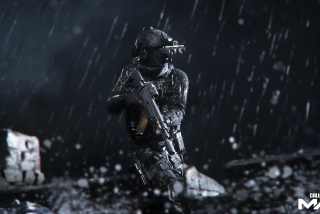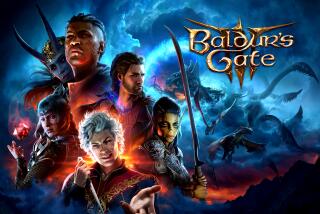Call of Duty: Black Ops launches Tuesday; Will it measure up?
- Share via
Mark Lamia, as the head of Treyarch Studio, is used to late nights overseeing the creation of what’s likely to be the biggest video game of the holidays, Call of Duty: Black Ops. But on a Monday in late October, Lamia stuck around even later than normal — until 1:30 a.m. — waiting to talk to a game journalist.
“I had just finished playing Black Ops at Treyarch, and when I walked out of the room, there he was standing there to ask me what I thought,” said Geoff Keighley, who hosts “GameTrailers TV” on MTV Networks’ Spike. “I’m not sure how long he stood there waiting, but you could tell he was a little nervous.”
Keighley told a visibly relieved Lamia he thought it was the best game Treyarch, owned by Activision Blizzard Inc., had made in its 14-year history.
The question is whether the best for Treyarch will be good enough for Call of Duty fans.
On Tuesday, when Black Ops hits store shelves, investors and fans of the franchise will be laser-focused on Treyarch and whether it can deliver the same lofty reviews, and blockbuster sales, as previous Call of Duty games developed by Infinity Ward, the studio that created the series but was decimated when Activision fired its two studio heads in March.
If Black Ops is able to match or exceed the estimated 20 million copies sold by Call of Duty: Modern Warfare 2, which was developed by Infinity Ward and released last November, it could prove to gamers and investors that the franchise has a future. If it falls short, it could demonstrate that gamers are souring on Call of Duty and one of Activision’s pillars is in danger of crumbling.
“It takes a few iterations to build a blockbuster franchise,” said Evan Wilson, an analyst with Pacific Crest Securities. “But it only takes one bad game to kill a franchise.”
No one is more aware of this than Lamia. His studio has developed two other Call of Duty games — Call of Duty 3 in 2006 and World at War in 2008. Both have sold millions of copies and were considered financial successes in their own rights.
But Treyarch historically toiled under the shadow of Infinity Ward, the Activision-owned Encino studio that many consider to be the best developer of the “shooter” genre of games. Infinity Ward’s Call of Duty titles have consistently scored better reviews and sold better than Treyarch’s.
“Much of the characterization of Treyarch as being the B team is accurate,” Wilson said. “Then again, it’s important to note that just about everybody is the B team if you compare them to Infinity Ward.”
That distinction ended when Jason West and Vince Zampella, fired from their posts as heads of Infinity Ward, left to form a new studio, Respawn. More than half of the developers at Infinity Ward left with them.
With Zampella and West gone, Lamia inherited sole possession of one of Activision’s biggest and most lucrative properties. It’s a role Lamia, who doesn’t boast the artistic background of many game developers, arguably has groomed for during his 15-year career at the company.
After graduating from Loyola Law School, Lamia took an entry-level job at Activision in 1995, burning CD-ROM discs in the company’s lab. He worked his way up to become assistant producer, producer and then, eventually, vice president of North American studios. He switched to Treyarch in 2006 and became its studio chief a year later.
Affable and animated, Lamia earned a reputation as a go-to executive when Activision needed to get things done, whether it was signing a publishing deal with a developer or making sure a game ships on time and on budget.
“Mark is an Activision lifer, someone who could always get the job done,” said Keighley, a longtime game journalist. “If all goes well with Black Ops, I expect he will be the man in charge of this Call of Duty brand going forward.”
Lamia feels the pressures facing his Santa Monica studio.
“More than ever, our work has to speak for itself,” Lamia said. “The game we made is different and unique. If we can focus on doing our best work, we can produce work that is at the top of our industry.”
Lamia’s studio is the antithesis of Infinity Ward, which had a testy relationship with Activision Chief Executive Bobby Kotick. Treyarch’s 200 employees work across the street from Activision’s offices in Santa Monica, and Lamia solicits frequent feedback from the publisher on Black Ops. Infinity Ward, by contrast, wouldn’t allow Activision executives to see Modern Warfare 2 until after it had been in development for more than a year.
Since Activision acquired Treyarch in 2001, the corporate parent has steered the game studio to its own priorities, including developing sequels of games from licenses such as Spider-Man. Since 2008, however, it has focused solely on Call of Duty.
Set during the Cold War era, Black Ops thrusts players in the role of CIA agents working on top-secret operations including the Bay of Pigs invasion in Cuba and the Vietnam War. It adds new elements such as piloting a helicopter and animation created in consultation with a former Soviet special operations soldier and voice work performed by film stars Sam Worthington and Ed Harris.
“After we made World at War, we wanted to focus on something entirely new and creative,” Lamia said. “The Cold War was totally fertile ground, and we’ve added elements that have never been seen in a Call of Duty game before.”
For many gamers, the ability to compete online against friends and strangers is what makes Call of Duty worth buying. Black Ops tries to expand on that heritage with an array of new online features, including the ability to record multi-player matches, edit the video to create combat movies and share the clips with other players.
“A lot of the questions for Treyarch come down to the multi-player, because that’s where Infinity Ward was off the charts,” said Adam Sessler, a host of the gaming news show “X-Play” on cable network G4. “For people who have a long-term relationship with Call of Duty, it’s all about online.”
With a budget estimated at more than $50 million, Black Ops is the most expensive Call of Duty game yet made. Its launch is backed by a massive marketing campaign featuring billboards, TV ads and outreach to gamers. One ad featured Kobe Bryant and Jimmy Kimmel as soldiers in a battlefield.
Kotick told Wall Street analysts during a conference call last week that the game should have an even bigger launch than the record-setting $500 million in sales that Modern Warfare 2 generated during its first five days.
That said, the company isn’t counting on sales to hold up as well. Its financial projections assume that Black Ops will sell less during the quarter ending Dec. 31 than its predecessor, Activision executives said during a recent earnings call. Wilson, the Pacific Crest analyst, projected sales of 14 million copies for Black Ops for the quarter, compared with a record 16 million for Modern Warfare 2.
Activision is already investing heavily in Call of Duty beyond this year. Along with Treyarch and a reorganized Infinity Ward, the publisher has established a new studio in Northern California to produce a Call of Duty spinoff game and has others contributing to the series. Raven Software in Wisconsin, for instance, is working on downloadable content tied to Black Ops.
Executives have told investors that a major expansion for Call of Duty is coming soon in East Asia, where online gaming is very popular.
“The deck has really been cleared on Call of Duty and now the moment is Treyarch’s,” Sessler said. “The question is if they can seize it.”






